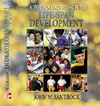 |  Life-Span Development: A Topical Approach John W. Santrock
Social Contexts of Development Schools, Achievement, and Work
Learning Objectives1.Explain the contemporary approaches to student learning, including the direct instruction, cognitive constructivist, and social constructivist approaches, as well as the learner-centered principles with a constructivist theme that have been advocated by the American Psychological Association. |
 |  |  | 2.Describe the issues involved in educating children and adolescents, including: - the many variations of early childhood education, keeping in mind how developmentally appropriate education is an important theme
- the special concern that early elementary school education proceeds too much on the basis of negative feedback to children
- the potentially stressful transition from elementary school to middle or junior high school
- successful schools for young adolescents:
- focus on individual differences
- show a deep concern for what is known about early adolescence
- emphasize social & cognitive development
|
 |  |  | 3.Discuss the transition to college, with its positive and negative features, noting that many college students are returning students, and adult education as a forum for older adults to increase their information and improve their skills. |
 |  |  | 4.Explore the issues involved in educating children with disabilities, such as: - An estimated 10 percent of U.S. children with a disability receive education services, noting that more than 50 percent of them are classified with learning disabilities, looking also at the increase in diagnosis of ADHD.
- Several laws have been passed in the United States to ensure that children with disabilities receive a free, appropriate education and are provided with adequate services.
|
 |  |  | 5.Expand on the relevance of socioeconomic status and ethnicity in schools, particularly with regard to the problems at home and school faced by children in poverty and the varied school experiences of children from different ethnic groups, and consider the different strategies that can be adopted to improve relationships among diverse others. |
 |  |  | 6.Understand how person/cognitive factors (internal motivation, attribution, self-efficacy, goal-setting, planning, and monitoring) are important aspects of achievement, looking at the variations in achievement across cultures and how socioeconomic status is a better predictor of achievement than ethnicity. |
 |  |  | 7.Consider the various elements of career exploration, including - the developmental changes that take place from the fantasies of childhood through serious exploration in the late teens and early twenties
- Holland's theory of personality and career
- linking career exploration with values
- the importance of monitoring occupational outlook
- the importance today of communication and computer skills
|
 |  |  | 8.Follow the transition from career development to work to retirement with respect to: - how work defines people in fundamental ways, with a special concern being that many women are juggling both career and family
- in middle adulthood, job satisfaction often increases although there are challenges the middle-aged worker faces challenges, noting, too, that midlife may especially be an important time to develop leisure activities
- the important change for older workers in that they are increasingly working part-time, and the paradox that while the United States moves toward later retirement, Europe has moved toward earlier retirement
|
|



 2002 McGraw-Hill Higher Education
2002 McGraw-Hill Higher Education